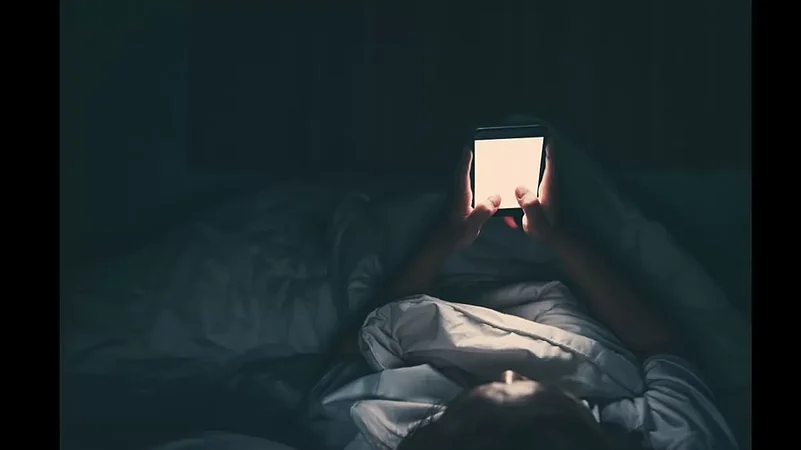The mother of Gunit Kaur is proud that her daughter filmed her last reel video in one shot. The video was a ‘collaboration’ with a beauty product brand called, Presque India. Gunit applies the face wash on her cheeks and elaborates on the details of the product and successfully pulls off what the advertiser wants. When she grows up, Gunit wants to be an “influencer” and she cannot wait when her followers will reach 25,000 on Instagram, which will give her the boost to open a YouTube channel where she will review beauty products.
Mumbai-based Gunit is just nine years old at present and studies in Class III. She is one of the thousands of "child artists" or kid influencers and digital content creators in India who are increasingly becoming part of the entertainment industry. It isn't just viral social media videos, these kids are featuring in product videos, lip-syncing to popular (and usually adult) trending reels, and role-playing characters, all in the name of parents allowing their kids to do “what they truly enjoy”.
Gunit’s mother Jasmeet, who handles her account admits, that she has little knowledge about Instagram or how the algorithm works. However, parental control on screen is a must to adhere to the social media policy. Nevertheless, it's Gunit who really does everything.
“I am very supportive of her talent and I believe it’s also an exercise of freedom. Look at all the positivity she receives around for her videos,” says Jasmeet, adding, “As long as she is balancing her academics well, we don’t stop her.”
Business of child's play
But it's not just child's play. The booming space of child influencers has catalysed the Rs 900-crore influencer market advertising industry, which is poised to reach Rs 2,200 crore in 2025, according to a report by The Print.
Companies are reporting significantly better Return on Investment (ROI) through influencer marketing compared to other forms of promotional strategies such as traditional advertising.
While these underaged influencers believe that by sharing the details of their everyday lives and vulnerabilities with followers, they are creating meaningful content and connection, the same creates another pool for advertisers to target and trick these children into consuming whatever they are being fed online.
“So long we did not take payments for reels, but now that Gunit is doing better and getting offers of collaborations, we are thinking of accepting payments,” says Gunit’s mother.
One can earn money in clicks and views, and children are best at generating views. While children under 13 are not allowed to have their own accounts by law, a lot happens behind the garb of parents controlling their accounts.
While children continue to perform for fame, unboxing make-up products, clothes, toys, food items, and so on, for parents that become another source of income. But what happens to the money?
Experts have argued that there is often mismanagement of the money by the parents. Following similar concerns over privacy and exploitation of child labour in any form, France recently issued the ‘Exploitation of the image of children on all online platforms bill’, which says if children are below the age of 16 then all the money earned by them will be protected. This also ensures that social media platforms are obligated to remove content at the request of the child.
Age of innocence
It's not just the financial aspect and the borderline child labour that is concerning about this growing industry of underage influencers. Fame and a constant public spotlight from such a young age may have adverse impacts on the development of children, especially and may lead to emotional and personality-driven difficulties in the latter stages of their lives.
A majority of psychologists believe that adults whose formative years were shared online may never grow out of experiencing a so-called "invisible audience".
“Children, who grow up with their needs being fulfilled by a fame coming from an invisible group of people, often face difficulty in expressing emotions as they grow up,” says Rashi Juneja, a Delhi-based psychotherapist, and visiting faculty at Amity University, Noida.
Being exposed to fame at such an early age can make children susceptible to adverse emotional fluctuations that may lead to the early onset of "adulthood". This is because constant exposure to adult content or ways of life leads to the secretion of certain hormones in children's bodies much before the right time, Rashi points out. “How do you expect them to handle the pressure of creating content once money is being minted of it?" she adds.
Gunit says that her tuition teacher is very supportive and often gives her extra hours off so that she gets back home and finds time to make her videos. “Many of my teacher’s friends are influencers and they guide me in the process of doing better and I am very thankful to them,” says the budding content creator.
"Children are not supposed to be ‘performing’ for money or competing with digital creators who have carved out a full-time profession it. It hampers their growth in ways parents don’t understand. It should be a growing concern that children are hitting puberty at a such young age and all thanks to social media,” Rashi says.
Besides, being driven by short-lived fame, children also do not understand concepts like consent or the nuanced complexities and possible dangers of unfettered internet use which makes them highly vulnerable to abuse. Children, however, can be “conditioned to know that when the phone is out, they should be behaving a certain way.”
What about children’s rights?
While children working in film sets are usually covered under various child protection and labour laws, children on social media at present lack any real legal safety net. With barely any laws regulating the nascent industry, child internet stars are at an increased risk of economic, labour or sexual exploitation.
With the increase in the uncensored use of social networking and digital marketing, kids are vulnerable to online fraud and aggressive marketing techniques as well.
In 2020, the Supreme Court sought the response of the Central government on a petition praying for a suitable legal framework to regulate access of minors to social media platforms.
“There exists no law in India to regulate minors’ access to social media. Since minors are prone to exploitation and harassment for not being able to comprehend the consequences of their actions on social media platforms, they need to be protected by law,” the petition, which was filed in July early that year, stated.
In 2021, a study commissioned by the National Commission for Protection of Child Rights (NCPCR) found that 37.8 per cent of children aged 10 years have a Facebook account while 24.3 per cent have an Instagram account.
This is in violation of norms laid down by social media platforms, the apex child rights body found.
While the world of glitz and glamour has always been appealing to everyone --- from adults to children --- constant exposure of children to social media may lead to further “fracturing of identity" with kids feeling increasingly disjointed when it comes to understanding who they really are as they grow older.


























